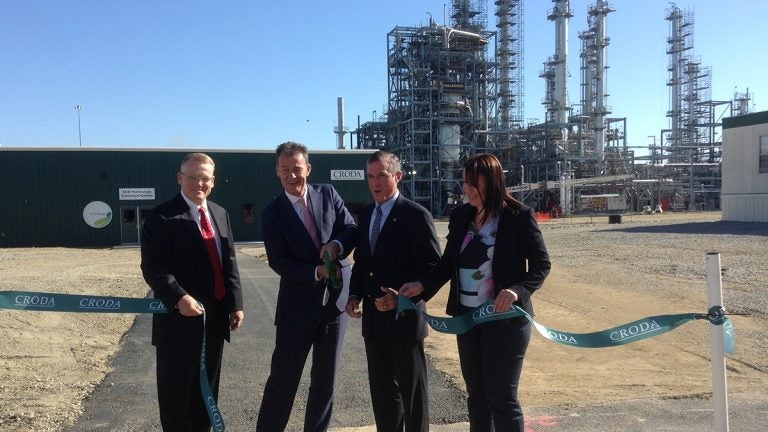Ribbon-cutting for first-of-its-kind chemical manufacturer in Delaware
Chemical company, Croda, said its Delaware plant can now make a key chemical bonding agent from 100 percent renewable resources.

Delaware Gov. John Carney attends ribbon-cutting ceremony for new Croda chemical manufacturing plant in New Castle (Zoe Read/WHYY)
A specialty chemical company said its Delaware plant can now make a key chemical bonding agent, common in household products, from 100 percent renewable resources. This is a first in North America.
On Wednesday, company executives for Croda and Gov. John Carney, D-Delaware, participated in a ribbon-cutting ceremony for the operation located in New Castle, at the base of the Delaware Memorial Bridge.
The estimated $170 million project, which began in April 2015, produced 250 construction jobs and will create 30 new full-time positions.
“I can’t think of a better facility to have now at the base of the Delaware Memorial Bridge, which is really a gateway to Delaware, which essentially says, ‘This is a state where innovative science-based companies like Croda want to set up,’” Carney said. “You could have gone anywhere, anywhere around the world. When we think of the things we need to do on the government side to attract businesses and keep businesses here, chief among them is to have strong successful businesses to have a tax and regulatory environment that’s conducive to businesses wanting to locate here, and to have a great workforce.”
Croda International, headquartered in the UK, manufactures naturally-based specialty chemicals at 67 operating sites worldwide. Its ingredients are used for a variety of products, like face creams, toothpaste and laundry detergent.
Robert Stewart, managing director of operations at the Atlas Point site in New Castle, said the expansion will allow the site, acquired in 2006, to reduce fossil fuel emissions by producing renewable, bio-based non-ionic surfactants. Surfactants are emulsifying agents that help keep water and oil mixed together.
Surfactants are traditionally produced from fossil fuel-based petrochemical ethylene.
“Ethylene oxide is traditionally produced from a petroleum route, so this now allows us to produce it from a sustainable route, which is ethanol,” Stewart said. “It helps the environment because that’s a much lower carbon route, starting with bio-based ethanol versus starting with petroleum from the ground. It’s also a very efficient plant, the design is very modern, it uses the best catalyst technology from scientific design, so it’s a very efficient plant from that standpoint. So the two combined reduces the carbon footprint of all the products that we will make from that starting material.”
In 2012, Croda invested $8 million in a renewable energy project using landfill gas to generate electricity and steam. In 2013, it invested $2.3 million in solar panels at Atlas Point, which reduced Croda’s annual carbon dioxide emissions by 11,600 tons.
Stewart said he’s also proud of the fact that no worker was injured during construction of the plant.
“We run our plants safely, we don’t want people to get hurt,” he said. “We’ve been able to work a little more than 650,000 work hours in a very difficult environment, in the winter, in the summer, and no one has been hurt on this project.”
WHYY is your source for fact-based, in-depth journalism and information. As a nonprofit organization, we rely on financial support from readers like you. Please give today.




